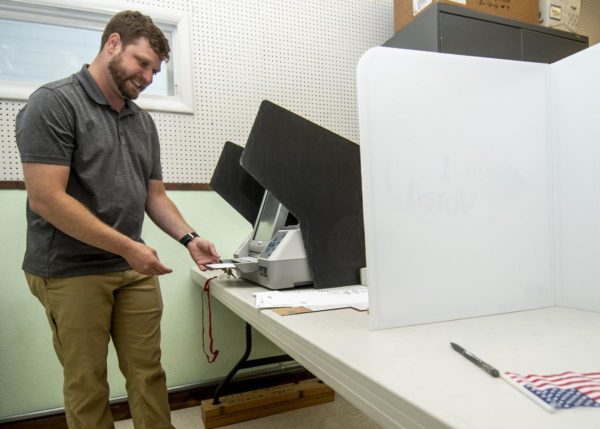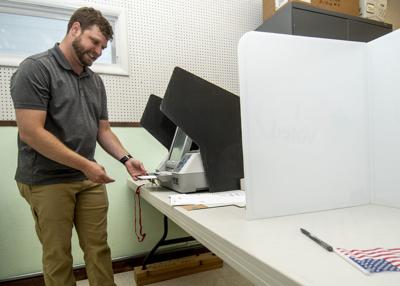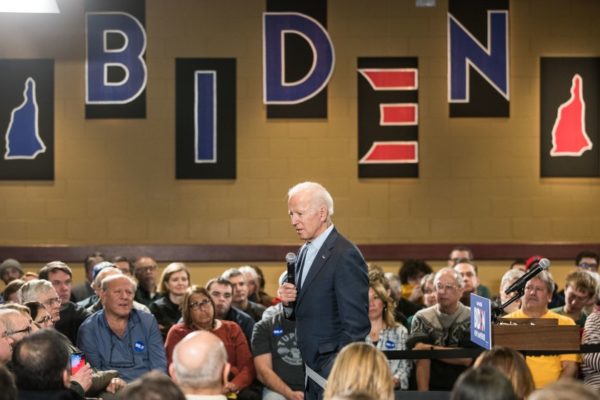Clerk and recorder: Ballot submission act ‘voter suppression’

Election supervisor Bradley Seaman tests voting equipment at the Missoula County Fairgrounds last year.
BEN ALLAN SMITH, Missoulian
As the state readies to handle up to possibly half a million forms in 2020 generated under a new law that requires documentation from people who drop off a ballot for someone else, county elections workers shared their concerns with lawmakers Thursday, with one clerk and recorder saying effects from the law amount to “voter suppression.”
The 2017 state Legislature passed a referendum that put the Montana Ballot Interference Prevention Act (BIPA) to voters the following year. Voters passed the referendum by 63%. It requires nearly everyone who turns in another person’s ballot to an elections office or polling place to fill out a registry form, and sets a $500 penalty for not complying.
Local election workers started implementing the law in 2019 in several local elections. Representatives from a few counties shared their observations with legislators on the interim State Administration and Veterans Affairs legislative committee.
“You’re probably not going to like this, but I refer to this as the voter suppression of 2018 (act),” said Rina Moore, the clerk and recorder in Cascade County.
Moore said her county worked hard to make it easy for people to drop off their ballots, with options like a 24-hour drop box monitored by a security camera at all times. That had to be shut down under BIPA.
The box previously saw 20 to 30 ballots deposited overnight, Moore said, and filled over the weekends, sometimes to the point where staff had to empty it.
“Because of this act, we’re basically telling the voters the only time you can drop your ballot off at the election office is the days we’re open for business,” Moore said, adding that option might not work for those who don’t work hours that would make it easy to get to the elections office during the daytime or have access to a vehicle.
Some of the legislators on the committee pushed back on calling BIPA voter suppression, saying that they were able to navigate the process and voters will become used to the requirements.
“I know it’s fun to throw out words like ‘voter suppression’ to get a rise out of people, but I think we have to keep in mind this was the first time it’s being used,” said state Rep. Forrest Mandeville, R-Columbus, and a candidate for Secretary of State. “People get used to it. Most states are using a similar process.”
Casey Hayes, the elections administrator in Gallatin County, said that collecting BIPA forms has created “literal traffic jams” for people trying to return ballots to his office. He also said voters perceive the new law as governmental overreach, and elections workers bear the brunt of their frustrations.
One voter in his county tore up his and his wife’s ballots and threw it at election clerks, Hayes said. The incident was reported to local police.
“This is a suppressive act,” Hayes said. “This is a way of suppressing voters.”
Elections administrators also said people who couldn’t drop off their ballots sometimes just deposit them in mailboxes near the elections offices. Because ballot envelopes have the county office as a return address they’re delivered even without postage and elections offices pick up the cost.
“Those ballots that people are refusing to fill out this form for are still making it into the mailbox in front of our courthouse and then the good mail carrier is bringing them to us,” Hayes said.
State Commissioner of Political Practices Jeff Mangan told the committee 16,840 forms have been submitted so far in 2019, with 90% of them filled out by a family member dropping of a ballot. He said he’d like to see more education around the law and its requirements before the June primary and November general election, when all the elected statewide offices, plus the U.S. House and a U.S. Senate seat are on the ballot, in addition to 125 spots in the state Legislator, positions on the state Public Service Commission, state Supreme Court and more.
Regina Plettenberg, clerk and recorder in Ravalli County, said people who were confused about the law in her county thought it would apply to strangers or political parties or organizations dropping off ballots, not family or friends.
Lawmakers also got an update about legal issues with a similar law in Arizona. It was challenged in U.S. District Court, where it was upheld. However, the U.S. 9th Circuit Court of Appeals reversed that ruling, stopping the state from enforcing the law. But following an appeal to the U.S. Supreme Court, a stay was issued that allows Arizona to enforce their law through its March primary.
It’s unclear, a legislative attorney said, what the Arizona case might mean for Montana’s law.







